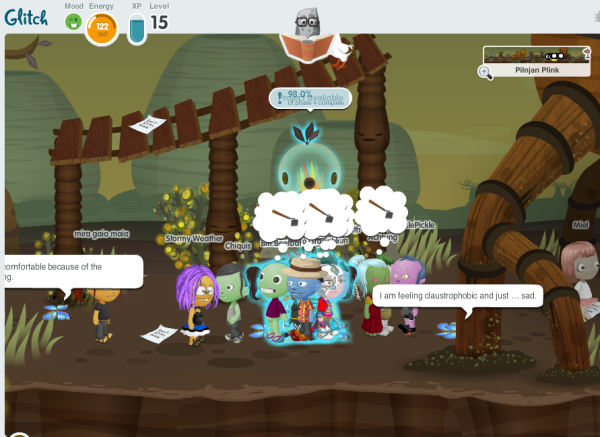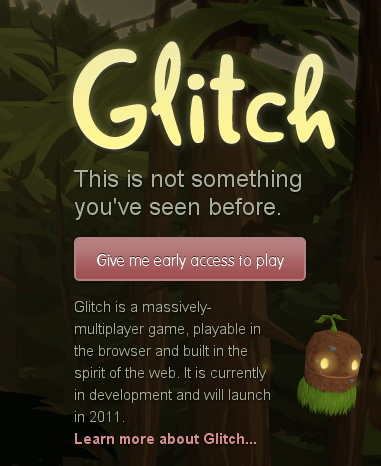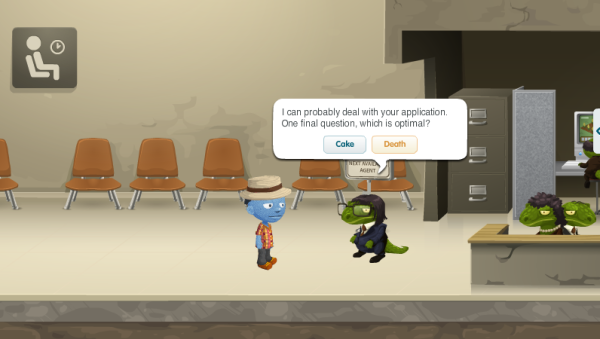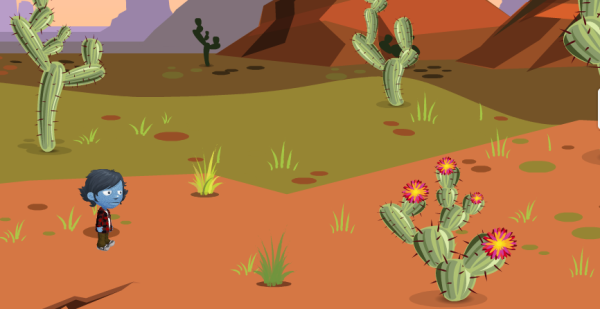According to Glitch’s website, I haven’t seen something like this before:
After playing the game pretty intensely for about three weeks, I don’t know what to think of that statement. There’s a lot about Glitch that’s incredibly new and refreshing– stuff that will influence the way some more-traditional MMOs are made, I hope. There’s also a lot about Glitch that’s astonishingly tired and conventional. The conventional and the radical often mix well in Glitch, but occasionally they don’t, and I can’t help but notice.
Glitch is a sidescrolling cooperative crafting MMO with a freemium payment model, played in Flash in a web browser. It’s not quite released yet, but when it is I’m sure that it will do well– it’s a heap of fun, no matter what I have to say about it. Plot-wise, you play a tiny person who lives in a universe that is currently being ‘imagined’ by eleven sleeping godlike giants. From what I gather, the name ‘Glitch’ is a reference to the weird and accidental ways independent life or culture forms in an ecosystem. In the world of these giants’ minds, the players are ‘mistakes,’ somehow. Their lives and their culture are happy accidents– much like our own.
And according to the info page of one large player group, the game’s creator, Flicker founder Stewart Butterfield, has said that “Glitch is a game about culture.” I haven’t been able to corroborate this quote, but I certainly hope it’s true, since there’s a lot of wisdom to it. Though Glitch gives its players many goals to pick and choose from, this game has a sandbox attitude, and many players treat it as a platform for social experimentation and creative acts of do-goodery. Some players drop cryptic, clue-bearing notes in the environment which lead others on a treasure-hunt. Some players host in-world events or parties to celebrate a variety of occasions. I’ve noticed two or three players who like to leave notes bearing poems from a variety of important modern authors hidden in the game’s subway stations or atop the game’s climbable trees. Quests are rare things in Glitch right now, and players tend to solve them as groups rather than on their own. Cooperation and cooperative invention are the stuff of culture, aren’t they? Glitch is rapidly developing an unusual culture of its own.
This is possible, I think, because Glitch is the first MMO I’ve seen that mechanically encourages goodwill. It also goes out of its way to encourage creative, cooperative problem-solving. For example: two people gathering on the same resource node will give each other resource bonuses, not compete with one another. There are achievements for everything, including making friends and giving other players free stuff– so everyone’s eager to do those things. The entire world is filled with tendable and destructable resource patches, and players must work together to keep them alive and productive. There’s hardly anything in Glitch which can’t benefit from cooperation.
This attitude is perhaps most pronounced in special in-game events called ‘Street Projects,’ which require players to team up and produce many random items in order to ‘build’ new explorable areas in the game itself. Though many players treat this as endgame content, many low-level players participate, since player power isn’t determined by level: like in Eve Online, skills are learned on a timer-based system that is totally decoupled from time spent playing the game itself. If there’s a thing to be done, chances are that anyone could contribute– so everyone does.
When I participate in a Street Project, I’ll find myself willfully handing over resources to people with better crafting abilities than me so that they can finish the tasks needed to assemble the street. I’ll willfully spend all my savings to buy stuff at the auction house to make a million scrambled eggs and turn them in to the collection point, totally unconcerned that I’m now utterly broke, with nothing to show for it. And I’m proud! I feel accomplished! I have spent all my crap, have an empty inventory, and I love it. It’s a crazy MMO that can accomplish this reaction in a player.

Glitch’s creators have put some great mechanics in place to incentivize the unusual atmosphere they want this game to have. Street Projects are one of the most successful examples: players crowd close around the resource drop-point, chattering away and handing hard-bought goods over to people they’ve never met before. When I’ve run out of things to contribute, I can sit down and cook food for everyone to raise their ‘mood’ and ‘energy,’ the two constantly-depleting stats which govern a player’s ability to influence the world. I can be helpful. That’ll make me feel good about myself. It’ll make me want to play again.
In most games, it’s game-controlled reward schemes which keep up a player’s hopes and keep them chugging away at the game. There are plenty of those in Glitch, but the more-powerful rewards are social, and are player-created. If I can help out in a Street Project, those people I helped will pitch in next time and help me. And if they do, I might do well enough to earn a trophy. Or perhaps the next time I try to do something weird and unusual in the game world– say, for example, copy an entire HP Lovecraft short story onto notes and lay them out in a row on a major street– those people will help me do it. Who knows? Investing in fellow-players is important, and it produces unusual rewards.
As part of its attempt to make something ‘you haven’t seen before,’ Glitch energetically avoids many traditional MMO sandtraps. Player wealth gaps are meaningless: they have no effect on the game world or a player’s ability to function in it. One of the main leveling techniques– “donating” items to the giants who rule this world– involves producing valuable items simply to toss them cheerfully down an actual money hole. It does a lot to encourage a kind of detachment to goods and wealth in the game: everything’s there to be given away. Player commitment gaps are also a non-issue. A casual player dipping in for half an hour a day will function just as well as someone who commits hours and hours a day. Everyone gets all their energy refilled every four hours; someone who only plays once every 24 hours will always find their stats maxed and ready to go, while someone who plays all day long will have a much harder time being productive. There are no questgivers, no towns of exclamation-points: all quests are triggered by player milestones. Achievement hunting isn’t something you see many players doing, either. Achievements are awarded at almost random numbers, like 151, 11, 10008, and 41. If you can’t tell when you’re going to be rewarded for a task, you’re less likely to grind away at it like a robot. And speaking of robots, there aren’t heaps of people lying around AFK all day long, turning major gathering points into ghost towns, like some MMOs I’ve played: players take a mood and energy hit every 90 seconds, forcing them to keep playing or die from inactivity. It keeps the world looking alive and active.
However, Glitch is still based on a traditionalist MMO foundation, and there’s a lot in it which is pretty darn typical and derivative. No matter how much I enjoy the interesting new places they’ve taken this game, Glitch’s creators are shackling some of those innovations to an ancient paradigm, and sometimes I wonder whether that will end up keeping the game floating low in the water.
First of all: this game is a grinding nightmare. Until extremely high skill levels, the only way to get any kind of resource is to grind away at producing it. And, yes: you can grind mining. And yes: loads and loads of people do. Whenever I sit down to mine repetitively, I’m reminded strongly of the short time I spend playing World of Warcraft. Grinding agricultural resources is more interesting, since the animals you harvest food from sometimes run away– but it’s still incredibly repetitive. And it costs energy to grind resources, meaning that you’ll need to turn a lot of those resources right around and make food to keep from running out of energy and dying. Many major crafting projects in Glitch, at low or medium skill levels, will take hours of repetitious clicking to accomplish. At higher levels, the rewards you get for each action increase, and some of them no longer require as many steps, so you’ll end up with a lot more stuff, and a lot more interesting things to do with it– but until then, grinding is the game’s foundation.
Making items is also a bit of a drag. It’s menu-based; ‘tool’ items simply enable crafting menus, like in plenty of other traditional MMOs. The game is based around crafting, so you tend to see a lot of these menus; sometimes I feel like I’m spending half my time in menus, watching progress bars tick. It makes me wonder why the developers resorted to traditionalist crafting systems when they managed to revamp so many more-entrenched MMO paradigms elsewhere in the game.
As it is now, however, Glitch also falls prey to the classic MMO inventory-management disaster. Unlike Minecraft, which makes up for its wide array of objects and tools with an intuitive click-and-drag inventory system and the ability to expand storage indefinitely, Glitch’s inventory interface is limited and difficult to use. This, coupled with the fact that I must carry around twenty-seven different tools in order to use all of my current skills– and many more items in order to do anything with those skills– makes dealing with tools and items a pretty big hassle. Every time I deal with the never-ending problem of my many item bags, I’m reminded, again, of World of Warcraft, where item-bagging is a bit of an art. And unlike Minecraft, which encourages players to stick close to a home base and only take what they need for a certain task, the world of Glitch is so big and sprawling, and the skills so interdependent, that I need to carry practically all my stuff around with me at every moment in order to accomplish anything at all. It’s irritating to get bogged down in this kind of stuff when the rest of the game is so refreshing and different.
Bit let’s face it: people actually enjoy grinding, and they’re willing to put up with inventory bullshit. They’ve done it in a million games before, and they’ll do it in a million others. There’s enough in Glitch to make dealing with these things worth it. Even if you’re the kind of person who can’t stand a progress bar, I’d take a look at Glitch, if just to sample the weird atmosphere and get a taste of the writing (which is incredibly good, by the way) and the community (which is refreshing). The character customization system– which I haven’t discussed, since I like it but find it less interesting than the game’s mechanics– is also pretty charming.
Let’s put it this way: in Glitch, I’m actually a drug dealer. That’s something I hope to write about soon: how to be a drug dealer in a charming game about cooperation and friendship. Any game that can pull this off with such panache is definitely something to take a look at.
Glitch recently closed its servers in order to execute the final player reset before its big release. I’d stay tuned for a chance to sign up within the next few weeks.




BeamSplashX
/ September 16, 2011It seems cute, for sure. Fans of A Tale in the Desert might find something to grab at in this.
Not for me, though. I’m a fightin’ man (at least for MMOs).
iamcal
/ September 28, 2011(I work on Glitch)
Great review! If you have ideas about how to fix our inventory woes, we’re hiring :)
Myles Grant (@Myles)
/ September 29, 2011(I work on Glitch, and Cal is my boss)
Best review I’ve read yet — we’ve been passing around quotes for the past few hours. And, yes, please, we are hiring.
lauramichet
/ September 30, 2011Woah guys, I’m glad you liked what I wrote!
Thanks for making such a fantastic game!
TLin
/ September 30, 2011Re: Inventory
Why not have a separate “equipment page” for blenders, seasoners, shovels, etc. Anything that people would only buy one of would go here instead of into the general inventory spot. That would get rid of 27 spaces.
On my 16:9 monitor, theres some space on my left side for a page, or you can just make it expandable. You can also add hotkeys for the tools too. F1-F12, for example.